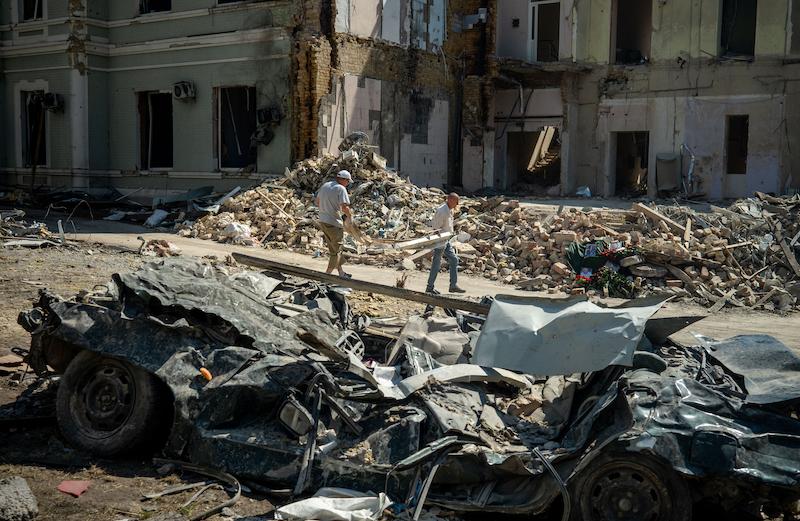
Debris in the aftermath of a recent Russian missile strike on the Okhmatdyt National Specialized Children's Hospital in Kyiv.
LONDON—A grim future lies ahead for Ukraine and NATO members in the face of Russia’s ongoing invasion, Ukrainian and British analysts agreed July 17 at the Global Air & Space Chiefs Conference here in the UK capital.
But the analysts split on the degree of pessimism warranted by the situation on the front lines in eastern Ukraine.
“We’re currently on a pathway toward Ukraine losing,” said RUSI Senior Research Fellow Justin Bronk, speaking at the conference.
Despite suffering more than 500,000 casualties, 3,000 tanks destroyed and 240 aircraft lost in 2.5 years, Russia has recovered enough to stretch Ukrainian defenses nearly to the breaking point during a recent counteroffensive, Bronk said.
“It can still be turned around,” Bronk said. “There is still a path to a more acceptable outcome, but on the current trajectory, Ukraine loses slowly at first and then potentially very quickly.”
Bronk estimated the timeline for Ukraine’s possible defeat could come within the next two years.
Asked to respond to Bronk’s assessment on a later panel, Ukrainian-born Viktoriya Fedorchak, a war studies lecturer in the Air Operations Division of Swedish Defense University, audibly scoffed at the prospect of a Russian victory, but acknowledged that Kyiv’s forces face a difficult immediate future.
“I think Justin makes an assessment [that is] a worst-case scenario,” Fedorchak said. “I would say the situation continues to be difficult and this summer will be defining in many ways.”
In recent months, Russia’s strategy on long-range strikes against Ukraine has changed, Fedorchak said.
“They are bombing more strategically important objects,” she added. This refers not only to electricity infrastructure, but also industry.
Other analysts, such as Michael Kofman, a senior fellow at the Carnegie Endowment for International Peace, have offered a different view. The recent Russian offensive against Kharkiv culminated in June with limited Russian gains, he said in a War on the Rocks podcast interview. Both sides appear to be settled into a long-term stalemate, lacking sufficient resources to exploit gaps or breakthroughs on the front lines.





